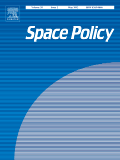
SPACE POLICY
Scope & Guideline
Exploring the Frontiers of Governance in Space.
Introduction
Aims and Scopes
- Space Governance and Policy Analysis:
The journal explores frameworks for space governance, including international treaties, national policies, and the roles of various actors in the space sector. - Public-Private Partnerships in Space:
A significant focus is on the dynamics between governmental space programs and private enterprises, examining how collaborations affect innovation, regulatory frameworks, and market growth. - Sustainability and Environmental Considerations:
The implications of space activities on Earth and other celestial bodies are critically analyzed, including discussions on debris management, resource extraction, and the ethical dimensions of space exploration. - Security and Geopolitical Implications:
Research often addresses the security challenges associated with space activities, including the militarization of space, cyber threats, and international relations. - Interdisciplinary Approaches to Space Issues:
The journal encourages contributions from various fields such as social sciences, humanities, and environmental studies, emphasizing the importance of diverse perspectives in understanding space policy. - Innovation and Technological Development:
It covers advancements in space technology and their impact on policy, including discussions on space transportation systems, satellite technologies, and emerging space economies.
Trending and Emerging
- Public-Private Partnerships and New Space Economy:
A surge in discussions surrounding the roles of private entities in space exploration and the implications of public-private partnerships is evident, reflecting the increasing commercialization of space. - Sustainability and Environmental Impact:
There is a growing emphasis on the sustainability of space activities, including environmental assessments and the preservation of celestial bodies, as awareness of ecological impacts rises. - Social and Ethical Dimensions of Space Exploration:
Emerging themes include the inclusion of social sciences and humanities perspectives in space policy discussions, addressing issues such as equity, representation, and the societal impacts of space activities. - Geopolitical Dynamics in Space:
Increasing analyses of the geopolitical implications of space exploration and the strategic interests of nations highlight the importance of understanding space in the context of global politics. - Technological Innovations and Regulatory Challenges:
Research is increasingly focusing on the regulatory frameworks needed to address innovations in space technology, including AI, space mining, and satellite mega-constellations.
Declining or Waning
- Traditional Nationalism in Space Policy:
While nationalism has been a significant theme in space policy discussions, recent papers have shifted towards collaborative international approaches, indicating a decline in purely nationalistic perspectives. - Historical Space Missions Analysis:
Research centered solely on historical missions, such as detailed examinations of past space programs, has decreased as the focus moves towards future-oriented policies and technologies. - Space Law's Conventional Frameworks:
There is a noticeable decline in papers discussing traditional space law frameworks without considering new technological advancements, such as commercial activities and private sector involvement. - Single-nation Space Initiatives:
Research that focuses on space activities from a single-nation perspective is waning, as there is a growing emphasis on international cooperation and multi-national partnerships. - Ethical Considerations in Isolation:
While ethics remain a relevant topic, discussions that treat ethical considerations in isolation from policy and technological impacts are becoming less frequent, indicating a trend towards integrated analyses.
Similar Journals

Artificial Satellites-Journal of Planetary Geodesy
Innovative Perspectives on Planetary Geodesy and Satellite ApplicationsArtificial Satellites-Journal of Planetary Geodesy is a pivotal academic journal dedicated to the field of planetary geodesy, focusing on the intersection of satellite technology and planetary sciences. Published by SCIENDO, this journal, with an ISSN of 0208-841X and an E-ISSN of 2083-6104, offers comprehensive insights into current research developments through peer-reviewed articles. Operating under an open-access model, the journal is accessible to a wide audience, fostering a collaborative environment among researchers and practitioners worldwide. Established in 2009, it has emerged as a significant resource, ranking in the Q4 category for Space and Planetary Science and recognized in the Scopus database, placing it within the 12th percentile among earth and planetary sciences journals. The journal's objective is to advance knowledge in the application of satellite technology to planetary studies, making it an essential platform for innovative research, methodological advancements, and interdisciplinary dialogues for professionals, researchers, and students in the field.
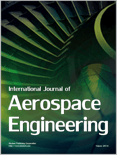
International Journal of Aerospace Engineering
Fostering Insight and Innovation in Aerospace EngineeringThe International Journal of Aerospace Engineering, published by HINDAWI LTD, stands at the forefront of innovation and research in the field of aerospace engineering. With an impact factor reflecting its contributions to the discipline and classified in Quartile 3 (Q3) for the year 2023, this journal provides a platform for high-quality, peer-reviewed articles that delve into advancements and challenges in aerospace technology and applications. Since its inception in 2008, the journal has embraced an Open Access model, promoting unrestricted dissemination of research findings to foster collaboration and knowledge sharing among researchers, professionals, and academia. The journal covers a broad spectrum of topics, aiming to enhance understanding and give insight into aerospace engineering's multifaceted aspects. With its coverage in the Scopus database, ranking 71 out of 153 in the aerospace engineering category, the journal is a valuable resource for those engaged in this dynamic field, ensuring that high-impact research receives the visibility it deserves.
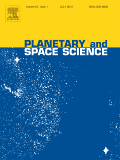
PLANETARY AND SPACE SCIENCE
Pioneering Research: Shaping the Future of Astral StudiesPLANETARY AND SPACE SCIENCE is a leading journal dedicated to the interdisciplinary field of astral studies, encompassing both planetary science and the exploration of space. Published by PERGAMON-ELSEVIER SCIENCE LTD in the United Kingdom, this journal has been pivotal since its inception in 1959, continually contributing to advancements in research about planetary bodies, their atmospheres, and the broader cosmic landscape. With an impressive impact factor, PLANETARY AND SPACE SCIENCE ranks in the second quartile of Astronomy and Astrophysics and the third quartile in Space and Planetary Science as of 2023, showcasing its scholarly significance. The journal aims to provide a platform for the dissemination of cutting-edge research, emphasizing the critical role of space exploration and planetary studies in understanding our universe. Researchers, professionals, and students alike are encouraged to explore the wealth of knowledge presented in its pages, fostering a deeper comprehension of the phenomena that shapes both our solar system and beyond.

New Space-The Journal of Space Entrepreneurship and Innovation
Igniting Innovation in the Final FrontierNew Space - The Journal of Space Entrepreneurship and Innovation is a pivotal publication dedicated to advancing the field of aerospace through innovative research and practical insights. Published by Mary Ann Liebert, Inc., this journal serves as a crucial platform for scholars, engineers, and entrepreneurs interested in the burgeoning sectors of space technology and commercial space endeavors. With an ISSN of 2168-0256 and an E-ISSN of 2168-0264, New Space explores the intersection of engineering, sustainability, and business within the aerospace industry. The journal's impact is highlighted by its Q3 ranking in multiple categories, including Aerospace Engineering and Astronomy and Astrophysics, signifying its relevance in contemporary research dialogues. Although currently closed access, the journal's dedication to fostering innovations is clear as it addresses critical topics from safety and risk management to energy technologies and tourism in space contexts. Researchers and professionals seeking to influence the future of space entrepreneurship will find valuable content and a collaborative community within these pages, making New Space an essential resource in its field.
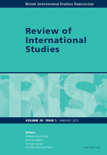
REVIEW OF INTERNATIONAL STUDIES
Fostering critical analysis of global affairs.REVIEW OF INTERNATIONAL STUDIES, published by Cambridge University Press, is a leading journal in the fields of Political Science and International Relations, with a robust focus on sociopolitical dynamics from a global perspective. Established in 1976, it has garnered a distinguished reputation, achieving a Q1 ranking in both Political Science and Sociology for 2023, underscoring its impact and relevance within the scholarly community. With an impressive Scopus ranking placing it in the 93rd percentile among peer journals in its field, this journal serves as an essential platform for researchers, professionals, and students engaged in critical analysis and discourse on international affairs. Although it does not currently offer Open Access options, the journal is committed to advancing knowledge through rigorous peer-reviewed research, contributing significantly to the academic dialogue surrounding global political issues.
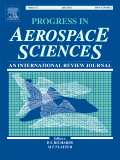
PROGRESS IN AEROSPACE SCIENCES
Leading the charge in aerospace engineering excellence.PROGRESS IN AEROSPACE SCIENCES is a prestigious journal published by PERGAMON-ELSEVIER SCIENCE LTD, recognized as a leading platform in the field of aerospace engineering, mechanical engineering, and mechanics of materials. With an impressive history dating back to 1961, the journal covers a wide spectrum of topics pivotal to advancing aerospace technology and innovation. Its recent ranking as Q1 in multiple engineering categories underscores its significance, ranking #1 in Aerospace Engineering and placing within the top 20 percentile in both Mechanical Engineering and Mechanics of Materials, according to Scopus assessments. Researchers, professionals, and students looking to engage with high-impact research will find PROGRESS IN AEROSPACE SCIENCES an invaluable resource, offering insights into cutting-edge developments and methodologies. Although it does not operate under an open-access model, the journal upholds rigorous peer-review standards, ensuring that the published content meets the highest academic integrity. Situated in the United Kingdom, it plays a critical role in fostering international collaboration and knowledge-sharing in the aerospace sector.

Space Science and Technology-Kosmicna Nauka i Tehnologia
Pioneering discoveries in space science and technology.Space Science and Technology-Kosmicna Nauka i Tehnologia is an esteemed journal dedicated to advancing knowledge in the fields of Aerospace Engineering and Space and Planetary Science. Published by the well-regarded PUBLISHING HOUSE AKADEMPERIODYKA in Ukraine, this journal serves as a vital platform for researchers, professionals, and students to share groundbreaking findings and innovative technologies related to space exploration and engineering techniques. Since its establishment in 2019, Space Science and Technology has contributed significantly to the academic discourse in its category, currently holding a Q4 quartile ranking in both Aerospace Engineering and Space and Planetary Science as of 2023. Although it does not offer open-access publication, its listed ISSN (1561-8889) and E-ISSN (2518-1459) ensure wide accessibility to its published content. As the journal continues its journey from 2019 to 2024, it strives to enhance its impact and H-index while fostering collaboration and knowledge dissemination across the global space science community.
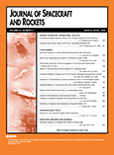
JOURNAL OF SPACECRAFT AND ROCKETS
Leading the Way in Rocket Science Excellence.The Journal of Spacecraft and Rockets, published by the American Institute of Aeronautics and Astronautics, serves as a premier platform for disseminating cutting-edge research in the fields of aerospace engineering and space science. Established in 1964, this esteemed journal has evolved over nearly six decades, solidifying its reputation with a consistent publication history through 2024. With an impact factor positioning it within the Q2 quartile in both Aerospace Engineering and Space and Planetary Science categories, it ranks as a vital resource, featuring high-quality manuscripts that address the latest advancements and findings in spacecraft design, propulsion systems, and austere planetary exploration. The journal's rigorous peer-review process ensures that articles meet the high academic standards expected by practitioners in the aerospace sector. Researchers, engineers, and students alike will find the Journal of Spacecraft and Rockets to be an invaluable resource for both foundational knowledge and innovative research developments, advancing the future of aeronautics and astronautics.
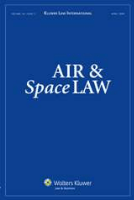
Air & Space Law
Exploring the Frontiers of Air and Space LawAir & Space Law is a prestigious academic journal published by Kluwer Law International, committed to advancing legal scholarship within the realm of air and space law. Serving as a critical platform for researchers, professionals, and students, this journal explores the intricate legal challenges arising from aviation and space exploration activities. With an ISSN of 0927-3379 and an E-ISSN of 1875-8339, it has established itself in the competitive legal landscape, currently holding a Q2 ranking in the Law category, positioning it within the top half of its field according to the latest Scopus metrics. Although it does not offer open access, the journal remains accessible to a wide audience via institutional subscriptions, disseminating pivotal insights that shape international policy and regulatory frameworks. The converged years from 2018 to 2024 reflect a commitment to evolving discourse, making it an invaluable resource for those engaged in the nuanced intersections of law, technology, and global governance.
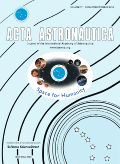
ACTA ASTRONAUTICA
Pioneering Research in Astronautics and BeyondACTA ASTRONAUTICA is a premier journal in the field of aerospace engineering, dedicated to advancing knowledge in space exploration and technology. Published by PERGAMON-ELSEVIER SCIENCE LTD in the United Kingdom, this journal boasts a prestigious Q1 ranking within its category as of 2023, positioning it in the top tier of aerospace engineering publications. With an ISSN of 0094-5765 and an E-ISSN of 1879-2030, ACTA ASTRONAUTICA has been a crucial resource for researchers and professionals since its inception in 1974, continuing to publish cutting-edge research through to 2024. The journal focuses on a wide range of topics, from orbital mechanics and spacecraft design to astronautics and planetary science, aiming to inspire innovation and facilitate the exchange of ideas among scholars, industry experts, and students. ACTA ASTRONAUTICA is ranked 19th out of 153 in its field, highlighting its importance and influence within the aerospace community. Researchers seeking a reputable platform to share their findings will find this journal to be an essential part of the academic discourse in aerospace engineering.